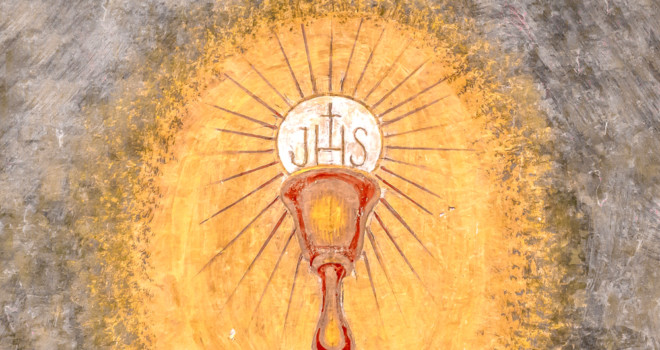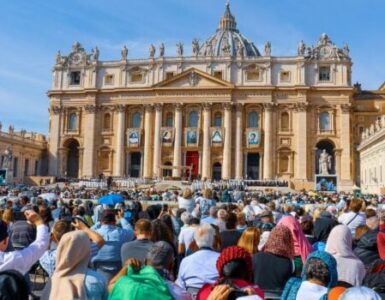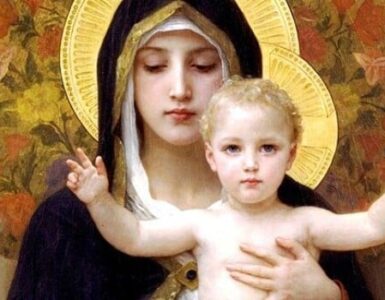Every week, we Catholics go to Mass and receive the
Eucharist. We go up the aisle to the priest or Eucharistic minister to
receive a small, circular wafer to eat, and then we walk back to our
seats. Judging by appearances alone, this can seem like a dry, mundane,
and even trite ritual, but it’s actually one of the most important parts of our
week. When we eat that little wafer, we are consuming powerful spiritual
food that will strengthen us to face the temptations, trials, and hardships of
the coming week. Just like our bodies need physical food to stay alive and
strong, so too do our souls need the Eucharist to maintain their spiritual life
and strength.
An Allegory in Acts
This truth is brought home to us in a clever way in the
Acts of the Apostles. Towards the end of the book, we find St. Paul being
brought to Rome, and on the way, he is shipwrecked on the island of Malta in a
big storm. Before the storm comes, Paul says that God won’t let anybody on
the ship die (Acts 27:22), but that doesn’t mean that they can just sit back
and let him do all the work. No, they have to do their part as well, and to
that end, Paul urges them to eat some food so they can have the strength to
survive the wreck. After this prompting, Paul takes some bread and begins to
eat, and everybody else on board follows his lead (Acts 27:35-36).
On the surface, this looks like a simple story that doesn’t
have much to do with our spiritual lives. However, if we look closely at
some of the details, we can see that it is actually an allegory for the
importance of the Eucharist. Luke tells the story in a way that
intentionally calls to mind the Eucharist in order to draw a parallel between
its role in our spiritual lives and the role of this meal in Paul’s and
the crew’s physical lives.
For Our Salvation
The first significant detail comes when Paul urges the crew
to eat. He tells them:
“Therefore I urge you to take some food; it will give you
strength, since not a hair is to perish from the head of any of you.” (Acts
27:34)
In the original Greek, the phrase translated “it will give
you strength” is literally “this is for your salvation,” and this is an
important clue to the deeper meaning of the passage. In both the Gospel of
Luke and Acts of the Apostles, the word used here for “salvation” often refers
to our eternal salvation (for example, Luke 19:9, Acts 4:12), and I would
suggest that in its deeper significance, the word has that same meaning in this
verse. However, we don’t want to overstate the case. This word can
refer to a physical rescue or deliverance (as it does, for example, in Acts
7:25), so it does not prove anything by itself. Rather, it is just the
first clue that there is more going on in this passage than meets the
eye. By using the word “salvation,” Luke is subtly telling us that this
story has a deeper spiritual meaning, and the rest of the passage will confirm
this.
Four Key Actions
Next, we have Luke’s description of Paul’s actions before
starting to eat. We read in the next verse:
“And when he had said this, he took bread, and giving
thanks to God in the presence of all he broke it and began to eat.” (Acts
27:35)
Again, on the surface this does not seem to have much to do
with the Eucharist, but if we look at these words closely, we’ll find a
pretty strong allusion to it. To see this, let’s turn to Luke’s
description of Jesus’ institution of the Eucharist at the Last Supper:
“And he took bread, and when he had given thanks he broke
it and gave it to them.” (Luke 22:19)
At the Last Supper, Jesus takes the bread, gives
thanks, breaks it, and then gives it to the
Apostles. Similarly, during the storm, Paul takes the bread, gives
thanks, breaks it, and then begins to eat. Luke is
intentionally describing Paul’s actions in a way that calls to mind what Jesus
did at the Last Supper. He is highlighting the similarities between their
actions with the bread in order to tell us that the meal Paul shared on the
ship has a connection to the Eucharist.
The Breaking of the Bread
To confirm this connection, let’s take a look at another
meal that looks a lot like the Last Supper. After Jesus rose from the dead
but before the Apostles knew about it, he appeared to two of his disciples as
they were traveling to a place called Emmaus. They did not recognize him,
so without knowing who they were talking to, they invited Jesus to stay with
them when they reached their destination. He obliged, and while they were
eating, he did something that should look very familiar to us:
“When he was at table with them, he took the bread and
blessed, and broke it, and gave it to them.” (Luke 24:30)
We see these same verbs here again (some of the Greek verbs
are slightly different in this passage, but they are similar enough to
unmistakably call to mind Jesus’ actions at the Last Supper), and this time
Luke explicitly points out the Eucharistic nature of this meal. In the
very next verse, we read that the disciples recognized Jesus once he performed
these actions (Luke 24:31), and then a few verses later Luke reiterates that they
recognized Jesus “in the breaking of the bread” (Luke 24:35). This last
verse is important because “the breaking of the bread” was an early name for
the Eucharist. In other words, Luke is telling us that these two disciples
recognized Jesus precisely because of his Eucharistic actions. They
recognized that he was repeating what he did at the Last Supper, which means
that the succession of verbs in this story is in fact a clue that Luke is
describing a celebration of the Eucharist.
An Allegory for the Eucharist
When we turn back to the story about Paul and the
shipwreck, we can see that by including those same verbs, Luke is telling us
that the meal Paul shared with his companions on the ship was also
Eucharistic. But there is a problem here. In his letters, Paul is
very clear that participating in the Eucharist is incompatible with
participating in pagan sacrifices (1 Corinthians 10:21), so it’s unlikely
that he would have celebrated the Eucharist with a group of non-Christians
(Paul was the only Christian on the ship).
How then do we reconcile that tension? I would suggest
that Luke doesn’t mean that this was literally the Eucharist. Rather, by
alluding to it and saying that this meal would be for people’s “salvation,” he is
telling us that this story is an allegory for the importance of the Eucharist
in our spiritual lives. Just as this meal was essential to the physical
survival of the people on the ship, so too is the Eucharist essential to our
spiritual survival. Just as the meal would strengthen them to survive the
storm and the coming shipwreck, so too does the Eucharist strengthen us to
survive whatever trials, tribulations, and temptations we may encounter in
our lives and to stay faithful to God through them all.
Simply put, God gives us the Eucharist for our salvation. It is a treasure trove of grace that sustains our spiritual lives like nothing else can, and it is imperative that we take advantage of this gift. Just as Paul urged the other people on the ship to eat some food to survive their shipwreck, so too does Luke urge us to receive the Eucharist in order to strengthen our souls to spiritually survive whatever hardships we may face on our journey to heaven.
✠










